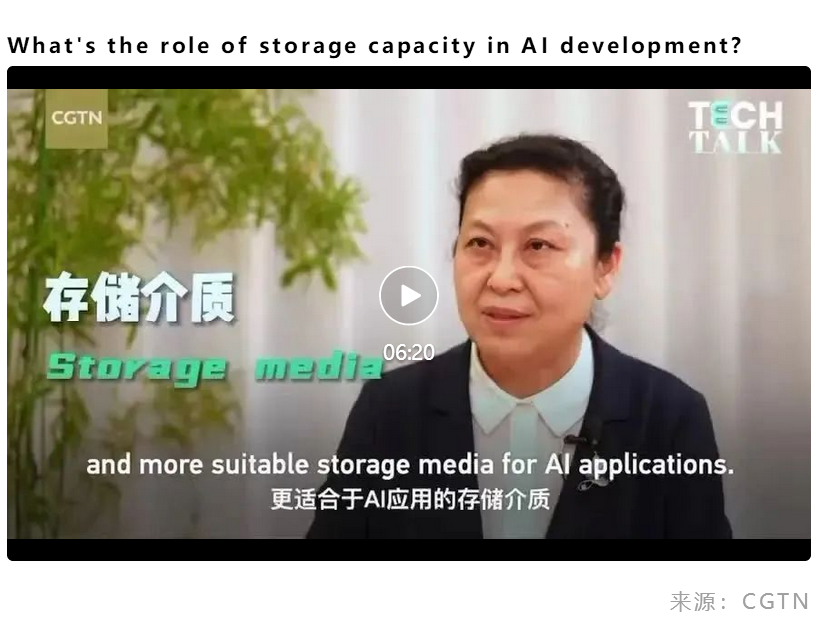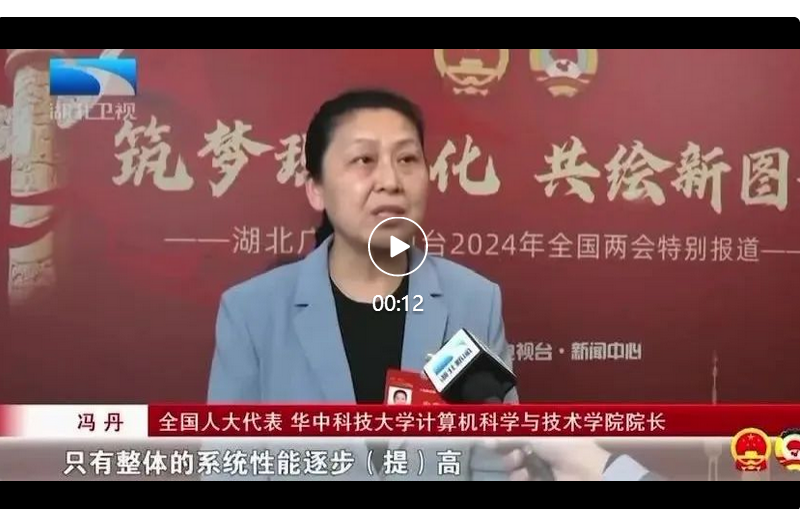Professor Feng Dan, a National People's Congress Deputy, Dean of the School of Computer Science, HUST, and Director of the Information Storage and Optical Display Laboratory at the Wuhan National Research Center for Optoelectronics, has received interviews from various media outlets, including People's Daily, Xinhua News Agency, China International Television Corporation, Science and Technology Daily, China Women's News, China Securities Journal, Hubei Daily, Changjiang Cloud News, and Mobile News in Wuhan. During these interviews, Professor Feng Dan further provided proposals on the construction and improvement of AI data storage industry standards, the regulation and guidance of the healthy development of the artificial intelligence industry, and the establishment of national-level comprehensive data storage management standards.
Storage technology is a "must-have" for developing the digital economy, which is a major trend for the future. As a National People's Congress Deputy and a professor at Huazhong University of Science and Technology, Professor Dan Feng has devoted more than 20 years to the research and development of storage technology, making massive information storage more secure and efficient.
"We must conduct research that pursues excellence," said Deputy Feng Dan. After years of development, China has advanced internationally in areas such as solid-state disk devices and massive storage systems. Many domestically produced mobile applications have effectively solved the problem of "lagging."
Source: People's Daily
Deputy Feng Dan proposed leveraging the collaboration between storage capacity and computing power and using system engineering to compensate for process disadvantages. For example, in addition to setting relevant indicators for AI computing power, such as scale, performance, and domestication rate, corresponding indicators for AI storage capacity, performance, and domestication rate should also be established to ensure the overall capacity and efficiency of the system for large-scale model training and inference.
She suggested accelerating the establishment of an AI storage industry standardization working group and incorporating AI storage industry standards into constructing the national artificial intelligence industry comprehensive standardization system. At the same time, based on the functional performance, industry applications, energy conservation, and environmental protection requirements of AI data storage technology and products, standardization work should be carried out continuously to improve the standardization system for AI storage.
Source: People's Daily
"To promote storage capacity as a new productive force." Feng Dan suggests increasing research and innovation funding for intelligent computing infrastructure and providing industry support to seize development opportunities, advancing innovation in AI storage in terms of high performance and ultimate reliability, and supporting and driving the high-quality development of artificial intelligence.
"To construct and improve AI data storage industry standards, regulating and guiding the healthy development of the artificial intelligence industry." Feng Dan proposes the establishment of an AI storage industry standardization working group and including AI storage industry standards in constructing the national comprehensive standardization system for the artificial intelligence industry.
Source: Xinhua Daily Telegraph

Feng Dan emphasizes that developing big data has become a national strategy, and storage is the foundation of the digital world. The capacity for data storage will directly impact the quality of economic and social development. "Data can only be utilized well if stored properly," says Feng Dan.
She suggests establishing comprehensive national-level data storage management standards as part of policy guidance, further strengthening the formulation of policies related to artificial intelligence security governance and platform construction, and raising the technical requirements for data security storage. Regarding industrial ecology, she recommends enhancing cooperation among various disaster recovery vendors in the data protection industry, promoting interdisciplinary collaboration and innovation between industry, academia, and research institutions, thereby effectively cultivating an open ecosystem for industry-academia-research cooperation and strengthening disaster recovery industry capabilities. In the technical aspect, it is necessary to expand new architectures for disaster recovery technology, incubate innovative advanced data disaster recovery technologies for the future, and further unleash the value of data.
Source: Science and Technology Daily
Feng Dan stated that the development of the computer industry is changing rapidly. Many cutting-edge technologies will only stay ahead for three to five years. If research results are promptly transformed, these technologies will quickly become updated. Therefore, universities and colleges must cooperate closely with enterprises to translate investment research outcomes swiftly and leverage their advantages in technological innovation.
"Technological innovation cannot do without talent, especially young talent." As a professor, Feng Dan has always regarded nurturing talent as a core and crucial task.
Source: China Women's News

In recent years, Hubei has embraced the opportunities the “ digits bring," achieving comprehensive empowerment in the digital economy. It leads in various indicators in central China, witnessing an increase in the quantity and quality of digital industries, solid progress in digital infrastructure construction, and accelerated implementation of characteristic applications. Feng Dan, a deputy to the National People's Congress, deputy chairman of the Hubei Provincial Committee of the Democratic League, and Dean of the School of Computer Science and Technology at HUST, expressed that the impressive achievements and remarkable digital developments are inspiring and encouraging.
Feng Dan stated that significant breakthroughs have been made in developing the digital economy, accelerating the transition towards a convenient and inclusive digital society, and continuously optimizing the efficiency of digital government construction. The beautiful vision of China's modernization is gradually becoming a reality.
Source: Hubei Daily

At this year's National People's Congress and the Chinese People's Political Consultative Conference (the Two Sessions), Hubei and Shanghai deputies discussed "building digital infrastructure moderately ahead and accelerating the formation of a nationwide integrated computing power system."
Feng Dan, a Deputy to the National People's Congress and Dean of the School of Computer Science and Technology at HUST, stated, "It is a systematic project where storage capacity and computing power need to be matched. Only when the overall system performance gradually improves can it better serve the computational needs of households and businesses regarding large-scale models and artificial intelligence."
Source: Changjiang Cloud News

